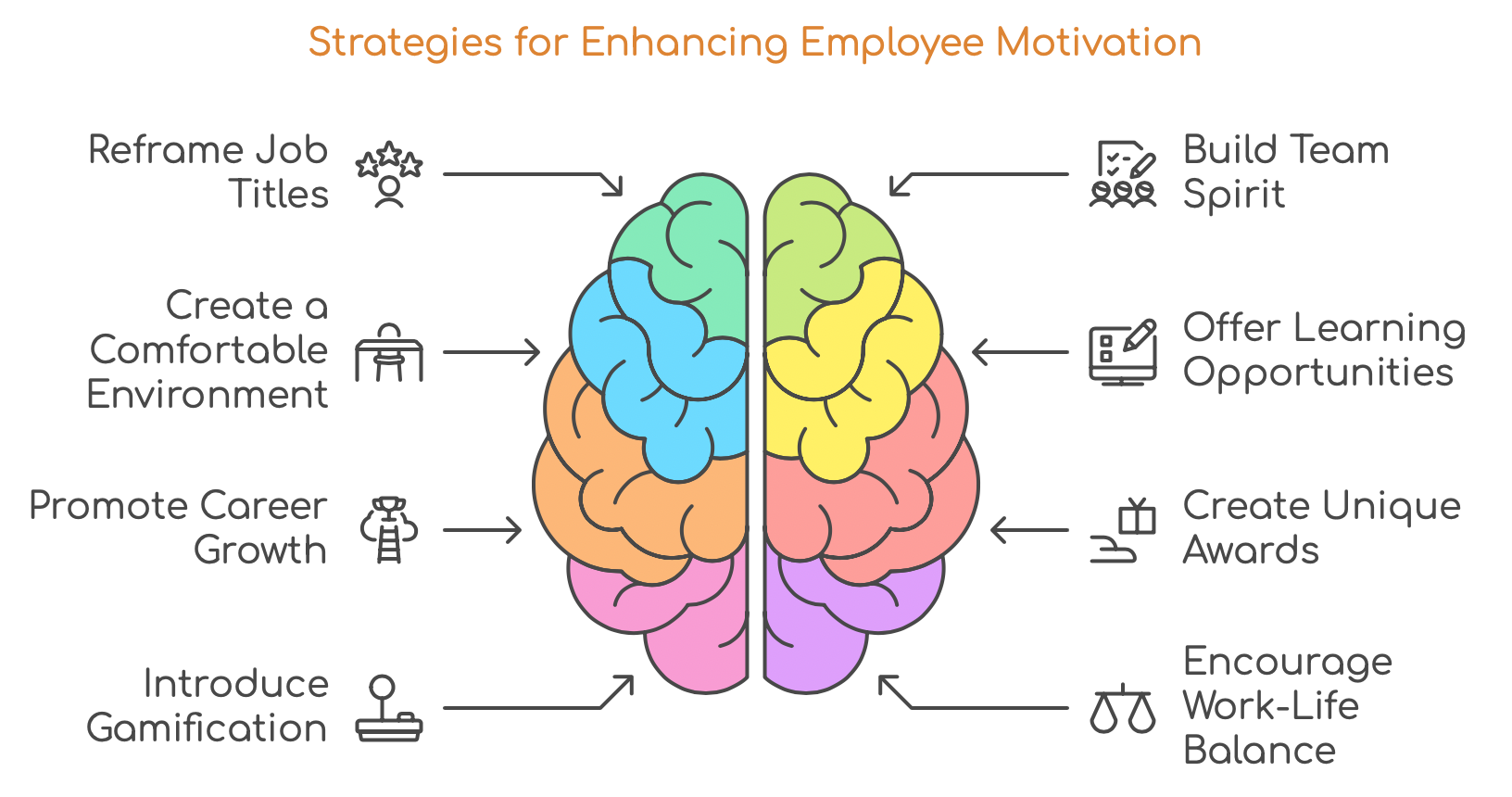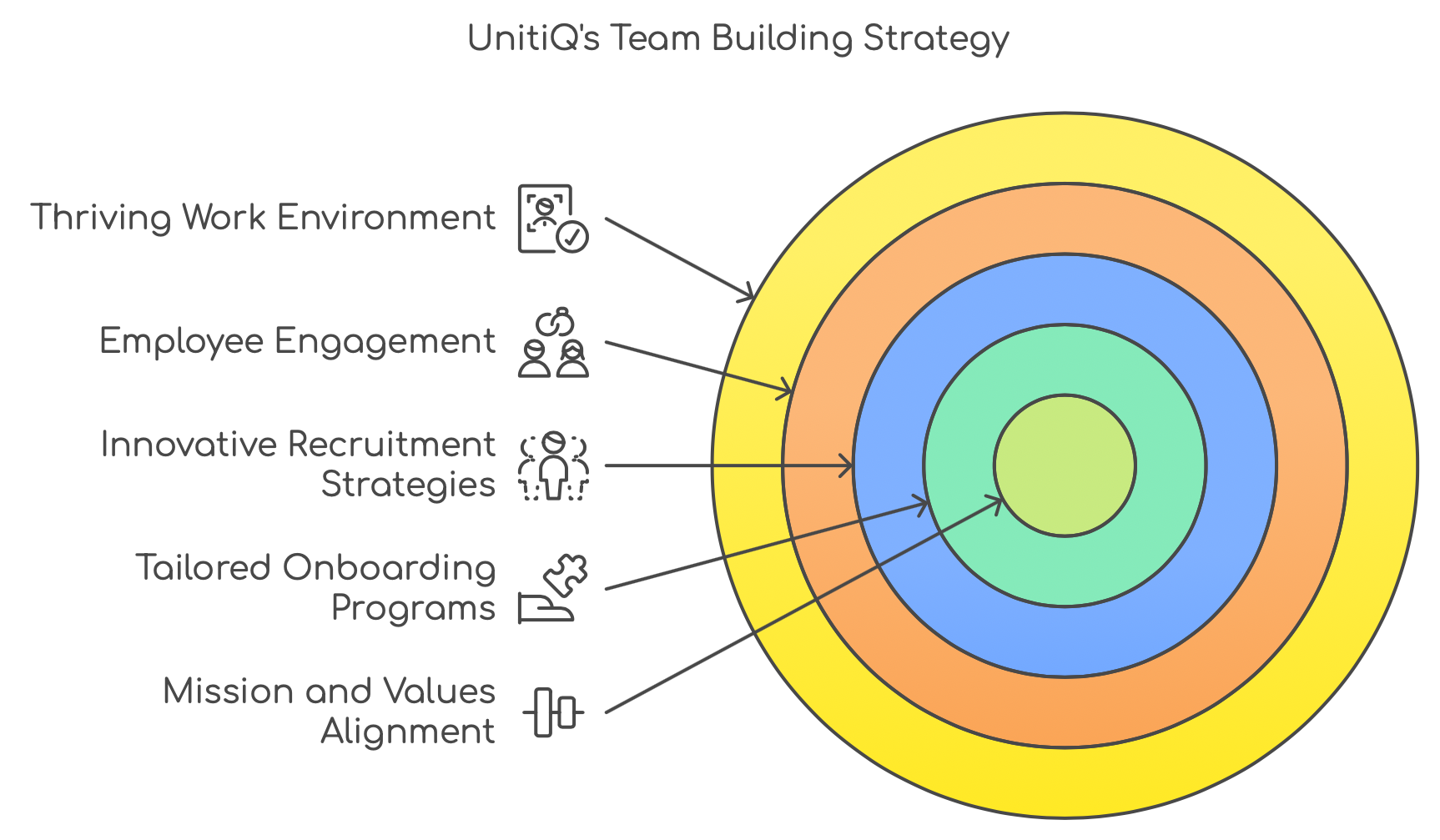10 Ways to Motivate Employees Without Money
How can you make employees work when they don’t feel like it? You can’t - forcing them is pointless. Instead, you need to discover what drives the people on your team, what gives them the energy to push themselves to new heights. Once you know this, they will have both the desire and the energy to perform. Every team has its own motivators, but here are 10 universal methods that I’ve found. These don’t require significant investment but noticeably boost employee productivity. I’m sharing them with you. Once you introduce all or some of the methods into your business, I also encourage you to include them into hiring process. Here are two articles about it: Transparency in Hiring: Beyond Salary Ranges and Job Descriptions and How Growing and Scaling Businesses Can Attract Top Talent: Proven HR Strategies for Success.

1. Reframe Job Titles
It’s great when a job title reflects the nature of the work, but it’s even better if the title gives a person a certain social status. You’ve probably heard the phrase, “What you name the ship determines how it sails.” This principle also applies to motivation.
A clear example: not everyone feels proud to tell their friends and family that they are a cleaner, despite the importance of the role. That’s where a simple motivation trick comes in—renaming the job.
Instead of “Cleaner” or “Janitor,” try something like “Cleaning Specialist,” “Cleanliness Manager,” or “Master of Integrated Services.” The work itself doesn’t change, but the status of the role improves in the eyes of others, and often, the employee’s attitude toward their work improves as well.
For instance, the title "Manager" has become so common that it’s lost some of its weight. But by adjusting it to something more specific, like "Project Leader" or "Client Relations Executive," you can reinvigorate the role’s significance.
How to Involve Employees in Renaming Roles:
- Ask them to reflect on the value and meaning of their work.
- Have them distinguish what they do best, something that sets them apart from others.
- Let them propose several title options and submit them for approval.
The positive effect of this approach begins even during the brainstorming phase—employees become engaged, “refresh” their perspective on the job, and redefine their tasks and sense of purpose.
In 2014, Dan Cable, a professor at the London Business School, conducted an experiment at the Make-A-Wish Foundation, a charity that helps children with critical illnesses. Employees were invited to rename their positions themselves. The results? An infectious disease specialist became a “Germ Slayer,” a nurse administering shots became a “Sniper,” and an X-ray technician was dubbed a “Bone Detective.” Employees who chose new job titles reported feeling more comfortable and less emotionally burnt out, both before and after the five-week experiment. Cable’s study found that titles sparked creativity and positively affected the organization’s atmosphere.
Check how we can help performing crucial People Projects as Fractional or Interim CHRO.
2. Build Team Spirit
A positive work environment and a strong team spirit are intangible but powerful motivators. The relationships between colleagues, and between managers and subordinates, have a direct impact on efficiency. When these relationships are based on mutual respect and trust—without crossing into unprofessional familiarity—work improves.
Here’s how to foster team spirit:
- Team-building activities: Games, quests, or other activities where the team solves puzzles or navigates challenges together are great options. These help employees bond, relax, and see each other in new ways. As a result, teamwork improves back at the office.
- Regular team meetings: It’s important to hold meetings not just in times of crisis but also to celebrate successes and discuss current goals. Publicly praise employees, express your gratitude, and highlight successful deals or future opportunities.
- Personal one-on-one conversations: Personal chats between managers and employees can build rapport and align personal and company goals more effectively. As a manager, try to go beyond strictly work-related conversations. Help your employees grow. Show interest in their lives—this can make all the difference in getting them fully engaged.
It’s not necessary to memorize every detail about your employees’ lives, but it helps to know the basics: Do they have a family? Where do they live? Why did they choose your company? Don’t hide in your office. Build genuine connections so your team knows that each individual is valued and recognized.
3. Create a Comfortable Environment
Job ads often mention “a cozy office with a coffee machine and snacks.” This isn’t just fluff—employees genuinely appreciate a comfortable working environment.
- Lighting and temperature: Check whether every workspace has adequate lighting. Employees working late or through the winter will especially appreciate this. Also, address any climate control issues—temperature wars in the office (some are cold, some are too hot) can hurt morale. Ensure everyone is comfortable.
- Ergonomic workstations: Upgrade uncomfortable furniture, like wobbly chairs, or install dividers in open-office spaces like call centers. Regardless of your industry, employees often spend at least 8 hours a day in the office, so it’s crucial that the work environment supports rather than hinders them.
- Healthy snacks: If possible, provide healthy food options. You could offer free lunch deliveries or subsidize meals from nearby restaurants. A small perk like this can go a long way in showing that you care about your team’s well-being.
4. Offer Learning Opportunities
Learning and development are crucial for keeping employees engaged and preventing burnout. It’s not just about career advancement; it’s about staying connected to the work itself.
- Provide access to industry-related e-books, webinars, mentoring, or even scheduled time for professional discussions.
- If the budget allows, offer online courses or organize training sessions. Continuous learning benefits both the employee and the company.
5. Promote Career Growth
Not everyone wants to move up the corporate ladder, as it often comes with greater responsibility and more pressure. But for those who do, or for those who need guidance, creating a clear career path is essential.
Some may not be ready to become managers immediately, but setting intermediate goals—like becoming a senior manager or mentoring others—can help employees develop important skills while working toward leadership roles. A good manager nurtures potential leaders by providing a clear development plan and feedback.
Remember that career progression isn’t always vertical. Not everyone needs to be a manager, but having strong subject-matter experts is just as valuable for the company.
I recommend you to read the following articles: Work as Your Own Trainer | Improve with Daily Challenges and of course learn what is the best - promote internaly or hire external leaders - Internal Growth vs. External Expertise: Deciding How to Build Your Leadership Team
I recommend you to read the following articles: Work as Your Own Trainer | Improve with Daily Challenges and of course learn what is the best - promote internaly or hire external leaders - Internal Growth vs. External Expertise: Deciding How to Build Your Leadership Team
6. Create Unique Awards
How do you recognize high performers? "Best Employee of the Month" may sound nice but is often overused. Instead, try coming up with more creative awards.
Here are a few ideas:
- "Sales Maestro"
- "Office Fairy"
- "Heart of the Reception"
- "Financial Wizard"
- "Career Oracle"
At the end of the month or quarter, hold a secret vote to choose winners. Reward them with something non-monetary, like dinner for two, theater tickets, or a spa day. Make sure the awards are fun, positive, and fairly given.
7. Introduce Gamification
Gamification is a great way to unite a team, boost interest in everyday tasks, and build a more collaborative environment. It can also help new employees adapt faster and make training more enjoyable.
Here’s a three-step approach:
- Identify motivation gaps in the workplace.
- Develop a system tailored to your business and team needs.
- Test and refine it based on employee feedback.
For example, "Bank X" introduced a loyalty program where employees earned internal currency for their achievements. Eventually, the program evolved into a virtual kingdom, complete with team-based tasks, battles, and a leaderboard. The result was a more engaged workforce, higher knowledge retention, and a stronger sense of loyalty.
8. Encourage Work-Life Balance
In 2020, a study showed that professionals like doctors and managers often struggle to balance work and personal life. In some roles, like sales or marketing, the pressure to perform leads to burnout and turnover.
Today, employees—especially younger ones—place a higher value on work-life balance than on high salaries. They don’t want to “die at their desks,” and rightfully so. When work takes precedence over health and family, even well-paid employees will burn out.
As a manager, ensure that your employees aren’t sacrificing their well-being for work. A balanced team is a productive team.
I recommend you to read related article: The Future of Leadership: Creating Communities Over Command
I recommend you to read related article: The Future of Leadership: Creating Communities Over Command
9. Show Gratitude
If you want to motivate your team, don’t skimp on gratitude. There are countless ways to show appreciation without spending a dime.
Here are 10 ideas:
- Record a video message thanking an employee for hitting their targets.
- Let them come in late or leave early if they’ve met their goals.
- Invite them to a high-level meeting.
- Call them in the morning to praise their efforts.
- Drop by their office unannounced to check in.
- Appoint them as a mentor for a new hire.
- Take a photo of them after a big win and post it on the office “Wall of Fame.”
- Thank them out of the blue, without a specific occasion.
- Offer a ride home in the company car.
- Relax the dress code on Fridays.
10. Be Human
Flexibility and understanding go a long way. If an employee is late once, don’t jump to punishment—everyone has bad days. Allow employees to take a break, recharge, and come back more focused.
If someone meets their targets, reward them with an early finish on Fridays or extra vacation days. If a team member has a child, don’t make them plead for time off to attend a school event. Be lenient within reason—employees who feel supported are much more likely to be productive and loyal.
Final Thoughts
These strategies reflect a shift in leadership from strict oversight to a more compassionate, employee-centered approach. In today’s work environment, money alone isn’t enough to retain talent or fuel motivation. Employees want to feel valued, respected, and given room to grow personally and professionally. Small changes in recognition, environment, and how you treat employees as individuals can create a ripple effect of positivity, engagement, and productivity.
It’s an art to get employees to love their jobs, but every leader has the potential to foster a workplace where people are not just counting down the days to the weekend but instead, striving to make each day more fulfilling than the last.
Here is a key ingredient you probably would like to build all those motivations around - The Missing Ingredient in Team Success: Discover How Enthusiasm Changes Everything
Here is a key ingredient you probably would like to build all those motivations around - The Missing Ingredient in Team Success: Discover How Enthusiasm Changes Everything
UnitiQ: Building Passionate, Motivated Teams That Thrive

UnitiQ helps businesses hire and build motivated teams by focusing on more than just skills and qualifications. With a deep understanding of company culture and employee engagement, UnitiQ matches organizations with candidates who not only fit the role but are passionate about their work. Through a combination of innovative recruitment strategies and tailored onboarding programs, UnitiQ ensures that new hires are aligned with the company's mission and values from day one. By fostering open communication, promoting personal growth, and encouraging a strong team dynamic, UnitiQ creates an environment where employees are not just working—they’re thriving, excited about their roles, and genuinely invested in the company’s success.
Contact me today for a free consultation, and let’s work together to set your business up for long-term success!
My Telegram
My LinkedIn
My Telegram
My LinkedIn
Author
Olga Fedoseeva is an award-winning HR executive and people strategist with over 20 years of international experience across EMEA, the US, and APAC. Currently Chief of Staff at Exponential Science and Founder of UnitiQ, she has personally hired more than 1,000 employees and scaled organizations from 30 to 3,000 staff. Recognized as one of the Top HR Women in EV (2021), Olga has led global HR transformation, talent acquisition, and people operations for startups, scale-ups, and multinational enterprises. Her expertise spans the full HR lifecycle—succession planning, DEI, HR tech integration, workforce planning, and executive coaching—helping businesses align people strategies with growth objectives while fostering inclusive, high-performance cultures.








